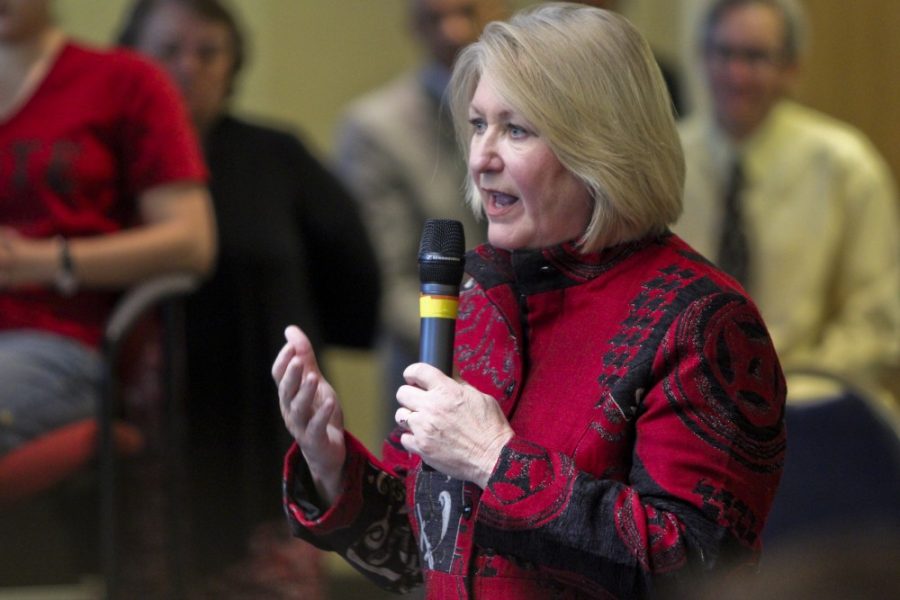UA President Hart discussed a variety of issues, including funding, building relationships in Phoenix and the importance of academic and medical centers, at her first town hall meeting on Wednesday.
Before Hart answered questions from the audience, she updated attendees on her strategy for the university. Hart explained university members’ work toward building an integrative plan for the next decade and beyond.
Hart said she hoped to share an outline of that vision, as well as her hopes and aspirations for the university, with the community at her inauguration at the end of November.
“I hope you will all take the opportunity when we have a rough draft of this envisioning of our academic hopes, to respond when invited to our town hall meetings,” she said.
Following Hart’s update on the strategy, senior vice president for Academic Affairs and provost Andrew Comrie opened the floor for questions, which ranged from cutting overhead on directed research to increasing funding for the Honors College.
When addressing a community member’s desire to have a nationally and internationally recognized Honors College on the campus, Hart said she has held discussions on how university members can bring in academic leaders and the student support team into bettering the honors experience.
Hart also addressed the concern of one attendee that he felt greater attention is paid to the athletic department than the Honors College. She stressed that the athletic program is one of the few in the country that is primarily self-supported.
“As you see the work we do in athletics, please rest assured that the source of that money is not a general fund of the university that would have been spent otherwise on the Honors College,” Hart added.
Hart also commented on her efforts to build relationships with Phoenix governors, legislators and leaders and said that her success in that area would be measured based on the ability for her to successfully advocate for the university.
In response to a question about academic and medical centers, Hart stressed the importance of academic medicine and health care in the U.S. and how they represent the biggest opportunities, as well as the greatest perils.
Hart talked about the UA medical schools and how the university is “right at the heart of the opportunity to affect the future of the American health care system and our definitions of wellness and health,” and “at the epicenter of the financial and professional peril that characterizes American health care right now.”
Additionally, Hart said she believes that this is one of the most important issues facing the university and that everyone should be aware and engaged in helping to create solutions.
As the town hall meeting came to a close, Hart responded to the final question. She was aked if she could think ahead five years, what would she like to say about her time at the university and what would she list as her proudest accomplishments.
Hart said she wants the community to meet down the line and be able to describe the institution they have shaped and created.
“We can plan all we want, we can do business plans, but we want to be able to sit around together, break bread and talk about why we are so proud of what we have accomplished in the last five years,” Hart replied.
Following the meeting, some attendees commented on their appreciation for Hart’s open communication about her strategy and what will be done for the university.
“I think she did a fantastic job,” said Hassan Hijazi, director of international alumni and development initiatives. “This is really a very good opportunity for us to hear from her firsthand about what’s going on at the university.”
Although there are no set plans for future town hall meetings, Hart said there will be many more in the future, which staff members believe will help connect campus members and allow them to get to know the university president.
“She’s so busy, she’s in Phoenix a lot, and it’s not always easy for folks from all over the university to be able to just ask her questions, get to know her and hear her thoughts on the university,” Comrie said. “She’s always interacting with people, but it’s tough on a president’s schedule to make that kind of time to meet with everyone individually, so when we can do it in a setting like this, so much the better.”









